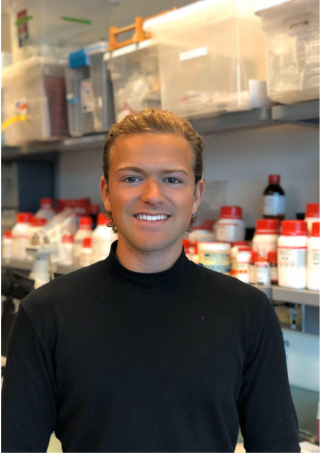
JUSTIN LESSARD-WAJCER
Justin entered the IPN in Fall 2019 as a student in the Ph.D. Rotation program. He recently received the prestigious Vanier Canada Graduate Scholarship.
Welcome to #IamIPN, Justin! You completed your undergraduate studies in neuroscience and psychology at Université de Montréal. What inspired you to pursue graduate studies at McGill?
The PhD rotation program was what inspired me initially. It would give me the opportunity to explore different topics of research. Of course studying in the city that I love, in a school that is renown for its pioneering studies in the field of neuroscience, and being nominated for the Vanier scholarship added to the draw. World-renowned professors and helpful mentors were the cherry on the cake.
Now that you're a student in the Ph.D. Rotation program, how has your experience been thus far? (The IPN Ph.D. program involves rotating between various labs so that you can learn and explore the diversity of neuroscience research).
So far it has exceeded all of my expectations but with the challenges brought on by Covid-19, I was unable to start my third rotation because all our projects were put on hold. Fortunately my current lab adapted to the new challenges and started work on a Covid-19 diagnostics project. Although it's not neuroscience-related, the experience re-affirmed my belief that the research field is where I belong.
Do you have a clearer idea as to the research you wish to take on during your Ph.D. degree? If yes, briefly explain.
The rotation program has definitely opened my eyes to several options. I'm currently debating between a wet lab (in bioengineering) and a dry lab (in artificial intelligence). My interest lies in patient care and treatment development, so that will probably influence the direction I take.
How do you want your research to contribute to neuroscience research, medicine, and the community?
Of course we all want our research to serve the greater good and result in positive change. Furthermore, I want my research to contribute to new methods of improving diagnosis, prognosis and intervention. I also hope to erase the stigma associated with mental health and believe future research should become streamlined and more easily shared.
Apart from academics, you're actively involved in the community. In what ways do you give back to the society, and what are you passionate about?
During my three years at the Douglas Mental Health Institute, I was sensitized to the stigma attached to mental illness. In many ways mental illness remains in the dark ages of public acceptance. But I believe that armed with new knowledge, a new awareness can ease and or eliminate the taboo and stigma that envelop mental health. To that end, I founded Neuropresse in 2017, an international online journal (neuropresse.com) dedicated to mental health. People with mental health issues offer anonymous testimonials which our editorial team supports with relevant articles, studies and videos aimed at informing the subject and the general population with the intention of reducing the stigma related to mental illness.
The Neuropresse team is 40 people strong and growing; it is a community of professors, doctors, communication specialists and students in neuroscience, psychology and medicine. My work resonated south of the border where I was brought on as a Consultant for Harvard University's innovative American mental health platform. Later this summer, in partnership with the Quebec government, our team will launch NURAU (nurau.com), the first interactive content platform in the province that addresses mental health issues for young people through podcasts with mental health advocates and professionals in the field.
For the last several years I served as Youth Ambassador for the Jewish General Hospital, where I organized fundraisers and activities for patients in psychiatry. Last year, I was named the hospital's youngest co-chairperson for Mindstrong, the largest mental health fundraiser in North America. This year in spite of the pandemic, we succeeded in raising over $1.6M for the psychiatric department of the Jewish General Hospital.
Do you have advice for students who are striving to strike a balance between their academic, professional, and personal lives?
I truly believe you have to follow your heart, and things should fall into place. Of course patience and a lot of stick-to-it-ive-ness will help. Personally, I make lists, keep schedules and have clear objectives. It is also very important to believe in your ability and capability of being exceptional. Listen to the voices in you that say you can and not the voices who may say otherwise. As a graduate student in a competitive environment, we must protect our mindset. You do this by insulating yourself and by that I mean surrounding yourself with motivating and positive people. It can be a challenge, but it is crucial. Your mindset is the defining factor of success.
Thank you for participating, Justin. We wish you all the best in your endeavours!

Published on July 7, 2020